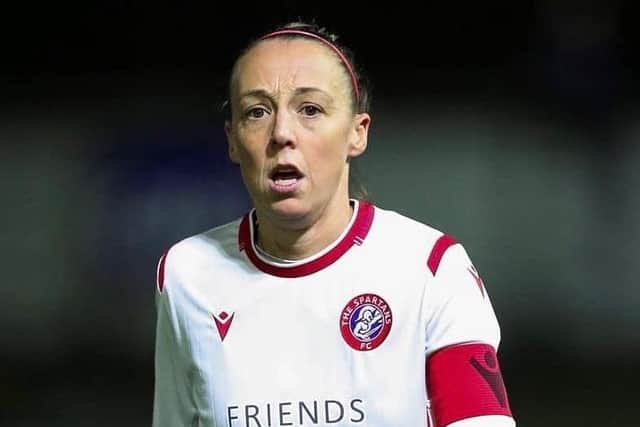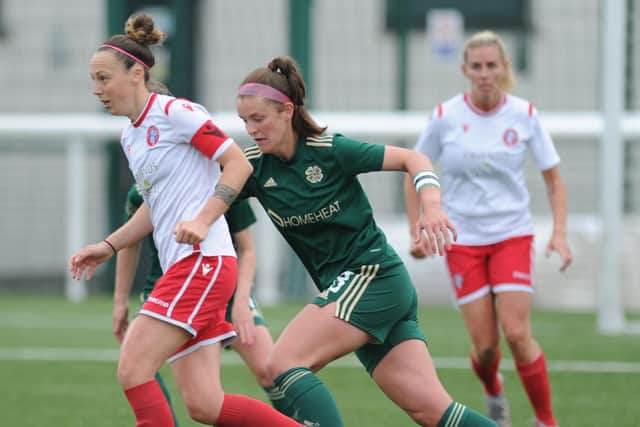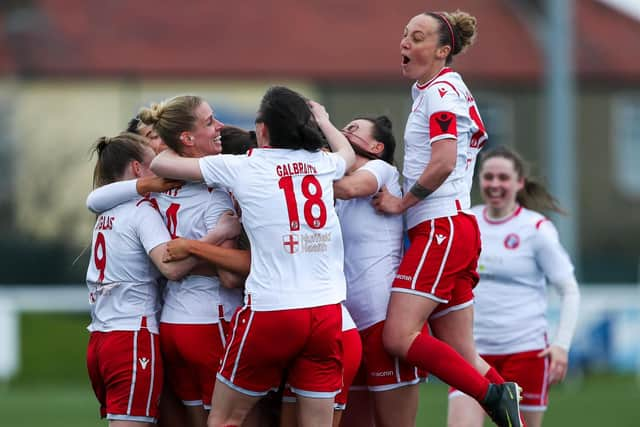Spartans captain Alana Marshall reveals struggle with multiple sclerosis as she prepares to make 200th appearance for club she loves
and live on Freeview channel 276
Wednesday’s SWPL1 match away to Partick Thistle will be a milestone moment for the club captain, who has also just marked her 35th birthday. Marshall is proud but does not feel like celebrating. She is scared.
Brave doesn’t even begin to cover her decision to use news of her landmark appearance in a Spartans shirt as an opportunity to talk for the first time about the struggle she’s had coming to terms with multiple sclerosis (MS).
Advertisement
Hide AdAdvertisement
Hide AdSince her diagnosis in November last year, the superfit engineer and mum of a two-year-old daughter has tried to block it out, carrying on as if nothing has happened. Never afraid of a challenge on the pitch, tackling this one off the pitch has been a scary prospect. Now, she knows it must be met head on.
In normal circumstances, Marshall would perhaps be looking forward to an end-of-season break at this time of year. Not this season.
The conclusion of the SWPL campaign this Sunday is a reality check moment. Her MS treatment begins in four weeks.
“I struggle with it,” she reveals with a tear in her eye and emotion in her voice. “It’s been hard because I’m so tired. I haven’t really been working through it. I’ve struggled mentally with it. I haven’t really taken it in.
Advertisement
Hide AdAdvertisement
Hide Ad“Since I got diagnosed I’ve been given booklets and stuff, but I’ve never read any of them because I tried not to accept that I have it. I’ve put it at the back of my mind. But I know it will get worse. It always does.”


MS is a lifelong condition for which there is currently no cure. It can affect the brain and spinal cord, causing a wide range of potential symptoms.
Spartans manager Debbi McCulloch noticed changes to Marshall’s personality before learning of her diagnosis, but along with her coaching staff, club officials and teammates has provided invaluable support since all was revealed in the dressing room. Incredibly, thanks to Marshall’s superb physical condition, she has continued to play week-in, week-out, completing another 90 minutes against Celtic on Sunday.
“My job is quite physical as well,” she explains. “You come here to Spartans and try to stay positive for everybody, but I do struggle fatigue-wise. It is really, really tough. But I’ve got good support at the club and that really matters.


Advertisement
Hide AdAdvertisement
Hide Ad“I have two lesions on my spine and a lesion on my brain. Every time I have a relapse I end up with another lesion. Because of this I have regular flare ups which results mostly in excruciating pain on the right side of my face which I can only describe as electric shocks.
“I’m on tablets for them. Every time I have a relapse, I’ll have a new symptom and then a new lesion. Eventually sometimes your mobility can go. In my case, I’m quite glad because I’ve been so active in my life it’s actually benefited me. That’s what the doctors have said. Hopefully the treatment will slow it down.
“I’m due to start transfusion treatment shortly and even though it will take its toll on me, I know everything will be OK, even though it won’t be easy. I get my first lot 15 days apart and then it is every six months.
“There’s no cure yet. There are about ten medications though. The one they are giving me is one of the best. But I’m quite nervous. I don’t know what to expect. It is a tough one. I don’t know how long I’ve really had it for. But I did change. I remember Debbi asking what’s up with me, why I became so angry. I used to be this happy person and then it just changed.”


Advertisement
Hide AdAdvertisement
Hide AdMarshall knows that there are more important things in life than football, but she is determined to keep playing next season if she can. Spartans have become her family and now she needs them more than ever. That’s also why she is so proud to be making her 200th appearance this week.
“It means everything because this club has been with me through so much stuff in my life,” she continues. “So to be captain and make my 200th appearance alongside people I love at the club means so much.
“It has been tough. My teammates have been amazing. I couldn’t ask for another group of girls. I think being here so long has made me just ... I would never move. This is where I’ll end my career.”
Born in Grangemouth, Marshall started her career at Falkirk Ladies and had spells at Hibs, Boroughmuir and Rangers, where she won four Scotland caps before joining Spartans in 2013. The north Edinburgh club and the women’s game in general has changed beyond all recognition in her nine years.
Advertisement
Hide AdAdvertisement
Hide Ad“The strips have got better,” she jokes. “We have a fantastic group of girls, all the youth players are coming through and obviously Debbi is still here, but it has changed. I think it has changed for the better.”
Spartans made the move to semi-professional status last summer, handing out contracts to keep up with the rest. But that hasn’t really made a significant difference. The players were just as committed before they were paid as they are now, still training three times a week.


It is that commitment that continues to inspire Marshall, who is a role model and mentor in more ways than one for the conveyor belt of young players who keep coming through the ranks and decide to stay.
“Playing for this club is not about playing for money,” she explains. “When I first started playing it was for enjoyment and, for me, at Spartans I still play for enjoyment. I know it is the exact same for every single girl in that changing room. Money doesn’t matter to us. We love this club and that is why we are so loyal.”
Advertisement
Hide AdAdvertisement
Hide AdThe love and loyalty goes both ways. Marshall knows Spartans will be her rock as she tackles the biggest challenge of her life.

